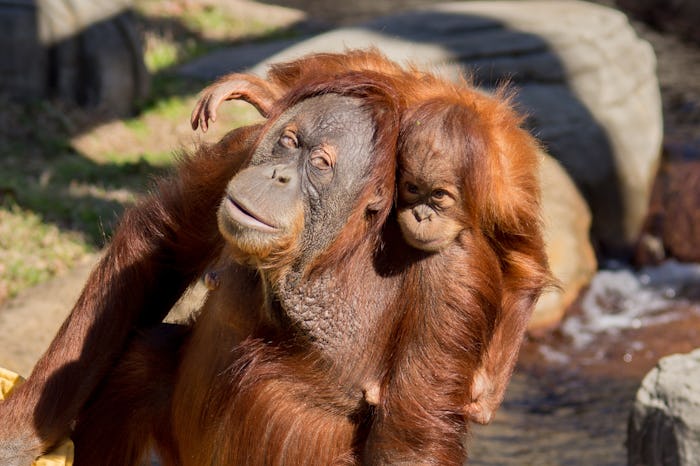Life

The 7 Best Moms In The Animal Kingdom Are Relatable AF
I love animals with a fierceness that cannot be contained. Animal Planet is one of only five channels I actually know the number of on my extensive cable lineup and I plan my year around Shark Week. I'm constantly amazed at the life that exists outside of humanity — some of these creatures are so much like us it's surreal. Take for instance the maternal instinct. Have you ever seen an animal with their baby at the zoo? It's beautiful to behold, and almost too much for my heart. So I compiled the best animal moms in the kingdom, because I want you to love them as much as I do.
When you think of mothers in the animal kingdom, what comes to mind? For me, it's the protective mama bear guarding her cubs or the kangaroo with a joey filling out her pouch. However, mammals don't have the corner on the market as far as epic parenting goes, and you might be surprised by the creatures that make the best mothers.
As a terribly insufferable hippie, tree-hugging vegan, I've always wondered about the finned and feathered animals about the planet. How do they mother? Is it purely a product of reproduction? I was shocked to learn of the close behavior of some of these animals when I spoke with Terry Boscomb, MS, adjunct lecturer, and PhD candidate in behavioral biology and zoology from Upstate New York, and the list reflects that.
1Orangutan
Boscomb tells Romper that the orangutan is extremely maternal. "They live with their babies attached to them pretty much all the time for a couple of years, and after that, it's like mommy homeschool to the nth degree." He says that while in the animal kingdom parenting is mostly modeling behavior, he's seen orangutans just sit and watch their child try and fail over and over again.
Which reminds me of teaching my littles how to tie their shoes or eat with a spoon. You show them how and wait to be splattered with avocado.
2Octopi
Octopi are absolutely mama martyrs. They'll lay thousands of eggs and wait around, guarding them with ferocious strength from the currents. This wait can last years, but they still wait. They fluff the water around the eggs to maintain the right environment and when the eggs hatch, they usher their babies out to sea and then die. That's serious commitment. Boscomb says that octopi can blend so seamlessly into their environment, it can be almost impossible to spot a nesting mother.
3Polar Bears
Ever lament the 40 pounds you put on with your last pregnancy? Don't feel badly anymore. The polar bear puts on about 10 times that when she gets pregnant, according to The Journey of Zoology. OK, so she gets to sleep through the birth, which is terribly unfair, but she'll then rear her cubs for a few years, nursing them and teaching them how to hunt, swim, build a den, and generally look adorable. She's the "mama bear" that made the term so concrete.
4African Elephant
These ladies are pregnant for 22 freaking months. Then they live in matriarchal societies that work collectively to nurture and raise the adorable, big eared babies. Boscomb says he once saw a mother use her trunk to siphon fluid out of her baby's trunk and then regurgitate the contents back into the mud. And you thought the NoseFrida was gross. Props, Mama.
5Crocodile
Who'd have thought of this one? Apparently, they're ridiculously protective and gentle parents. Crocodiles lay eggs in a compost heap that works to warm the eggs so mama can rest in cooler waters. Once she anticipates their hatching, she returns and waits. When they're born, she carries them in her jaw down to the water where they hang out and feast on insects, according to The Journal of Zoology.
6Cheetahs
Cheetah babies are born helpless and extremely vulnerable which means they are screaming tasty morsels for any predator looming nearby. A cheetah mom frequently has four to seven cubs per litter, and she has to do everything for them, including protection, for two solid years before she goes on and repeats the process, according to ZooBiology.
7Seals
According to Boscomb, seals will gain nearly a third of their body weight during pregnancy and then promptly lose it in one month postpartum because they feed a very fat rich milk to their babies for almost two weeks solid without ever eating themselves. Then they have to go on to contend with raising a baby on an ice shelf while protecting them from polar bears and poachers.
We need to remember that all of the animals listed above live in areas where their environment is shrinking. Their work is made doubly hard by dwindling resources and rising ocean and river temperatures. Human hunting and climate change is making their already tough lives tougher so it's worth considering that when you're taking care of your own babies. Animal or human, us mamas are more alike than different.
Check out Romper's new video series, Bearing The Motherload, where disagreeing parents from different sides of an issue sit down with a mediator and talk about how to support (and not judge) each other’s parenting perspectives. New episodes air Mondays on Facebook.